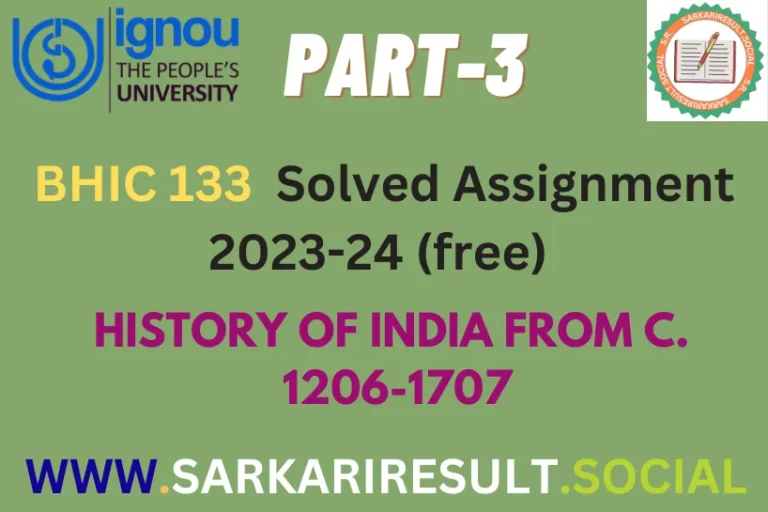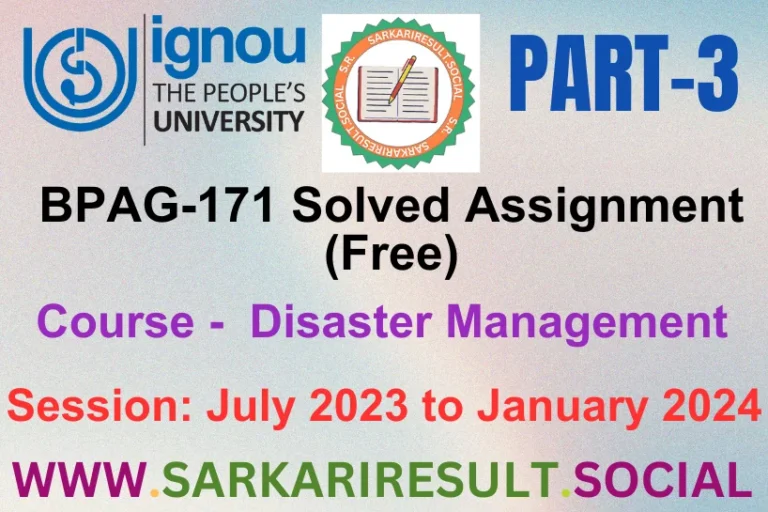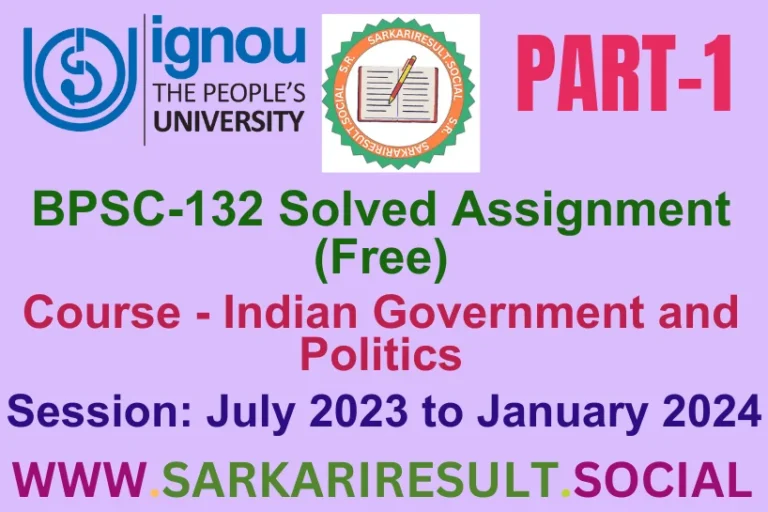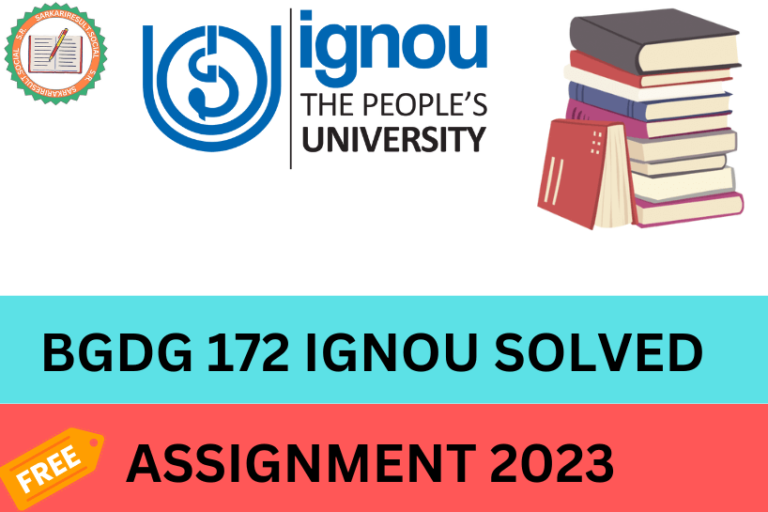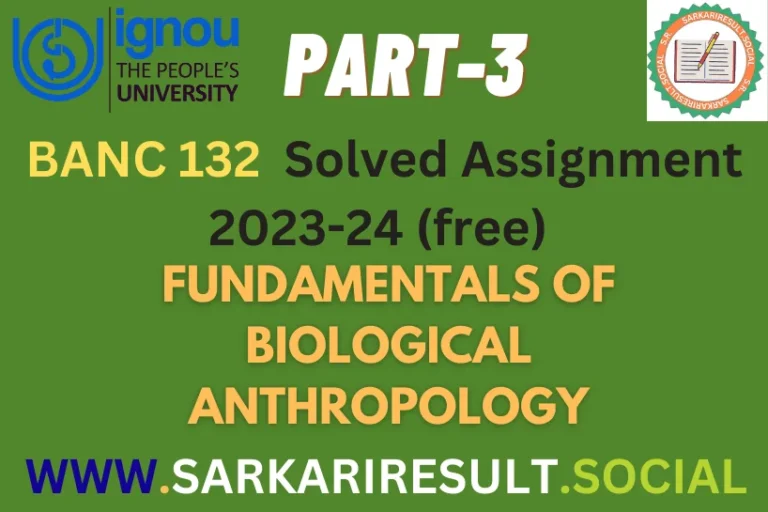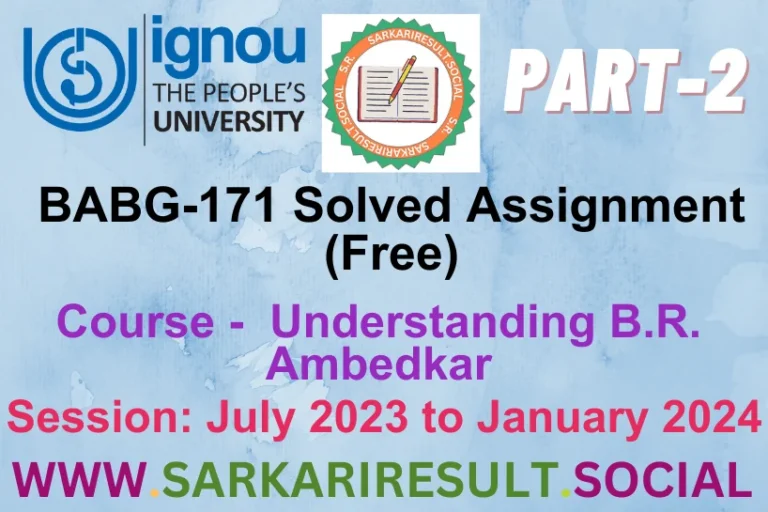Check BPSC 131 IGNOU Solved Assignment 2023 (Free) in HIGH QUALITY
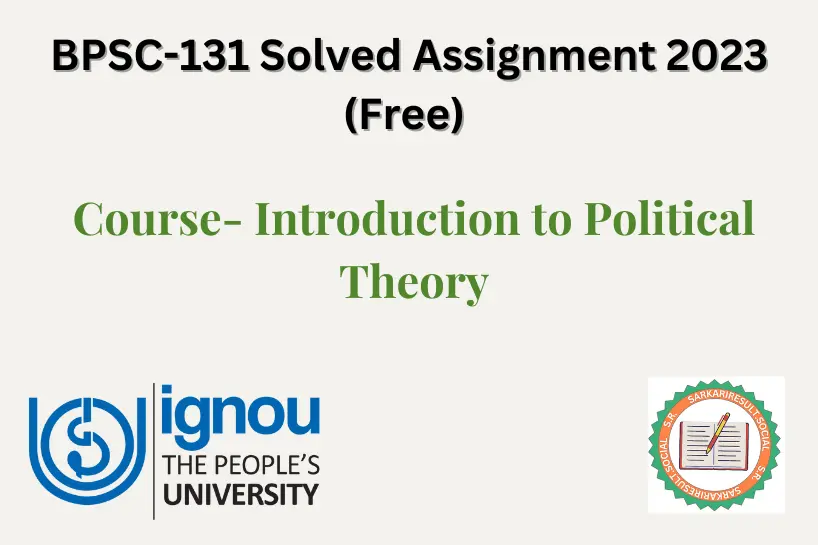
BPSC 131 IGNOU Solved Assignment 2023 (Free)
BPSC-131: Introduction to Political Theory is a course offered by IGNOU, designed for students eager to delve into the fascinating world of political theory. This course serves as an excellent foundation for understanding the fundamental concepts, ideologies, and frameworks that shape the field of politics.
To support students in their learning journey, we provides IGNOU solved assignments that serve as valuable resources for IGNOU assignment. These assignments not only reinforce the concepts learned but also encourage students to think critically and develop their own perspectives on political theories.
BPSC 131 Assignment Important Details 2023
| Programme code | BACHELOR OF ARTS PROGRAMME (BAG) |
|---|---|
| Subject Code | BPSC 131 |
| Subject Title | INTRODUCTION TO POLITICAL THEORY |
| Last date to submit assignment (extended) | 15 May 2023 |
| Eligibility | July 2022- June 2023 session students and January 2023 session students |
| Official Last date to submit | 30 April 2023 (over) |
| Total Marks | 100 Marks |
| Number of Parts to complete | 3 parts (Assignment – I, Assignment – II and Assignment – III) |
| Number of questions | 10 |
Questions and Answers (Solved)
Assignment – I
Q.1 Write a note on politics as a political activity.
Ans. Politics is an essential aspect of our lives, influencing how societies function and make decisions. It involves the activities, actions, and ideas that shape the governance of a country or community.
Politics:
Politics can be defined as the process through which individuals and groups make decisions that apply to everyone in a society.
It involves the competition for power, the formation of government, and the development of policies and laws that guide a community. Politics affects various aspects of our lives, such as education, healthcare, and the economy. It influences resource distribution, conflict resolution, and addressing the needs and interests of different individuals and groups.
Political Activity:
Political activity refers to the actions and behaviors individuals and groups undertake to influence political decisions and shape public policies. It encompasses voting in elections, participating in political campaigns, attending public meetings and rallies, and engaging in debates and discussions about political issues.
Political activity also involves joining political parties, running for office, and working as activists or advocates for specific causes.
Significance of Political Activity:
Political activity is crucial because it allows citizens to express their opinions, contribute to decision-making processes, and hold their leaders accountable. By participating in political activities, individuals can voice their concerns, advocate for change, and work towards shaping a better society.
It ensures that diverse perspectives are considered and decisions are made in the best interest of the community.
Through political activity, individuals can address social injustices, promote equality, and protect the rights of marginalized groups. It enables citizens to engage in peaceful means of expressing grievances and seeking solutions to societal problems.
Political activity also fosters a sense of civic responsibility and encourages active citizenship. When people actively participate in politics, they become more informed about the issues affecting their lives and the world around them.
They develop critical thinking skills, learn to evaluate different viewpoints, and make informed decisions.
In conclusion, politics as a political activity plays a vital role in our lives. By engaging in political activities, individuals can shape the governance of their societies, influence decision-making processes, and work towards creating a just and equitable world for all. It is through political participation that we can make our voices heard and bring about positive change.

Q.2 Examine if political theory is dead.
Ans. Political theory is a field of study that explores ideas, concepts, and frameworks to understand political systems and governance. However, some argue that political theory is dead, claiming it has lost its relevance in modern times.
- Understanding Political Systems: Political theory helps us comprehend how political systems function and the underlying principles that guide them. It examines concepts like democracy, authoritarianism, and socialism, allowing us to analyze different forms of government and their impact on societies.
- Evaluating Political Ideas: Political theory provides a framework to evaluate political ideas and ideologies. By studying theories such as liberalism, conservatism, and socialism, we can critically analyze their strengths, weaknesses, and implications for society. This helps us make informed decisions and engage in constructive debates about political issues.
- Reflecting on Power and Justice: Political theory helps us explore questions of power, justice, and equality. It prompts us to consider whether the distribution of power is fair, whether everyone’s rights are protected, and how societies can create a just and inclusive environment for all. These reflections are essential for addressing social and political challenges.
- Guiding Political Action: Political theory informs political action and activism. It provides a basis for advocating for change, challenging oppressive systems, and promoting social justice. By understanding political theories, individuals and groups can develop strategies to shape public policies and work towards a more equitable society.
- Historical Perspective: Political theory allows us to examine the ideas and philosophies that have shaped our political history. It helps us understand the reasons behind significant events, revolutions, and social movements. By studying the past, we can learn from successes and failures, leading to better decision-making in the present.
Conclusion:– Political theory is far from dead; it continues to be relevant and necessary in our modern world. It helps us understand political systems, evaluate ideas, reflect on power and justice, guide political action, and gain insights from history. Political theory equips us with the tools to critically analyze and engage with political issues, ensuring that we can actively participate in shaping our societies.
While the field of political theory may evolve and adapt to new challenges, its fundamental role in fostering informed citizenship and promoting democratic values remains crucial. Therefore, it is essential to recognize the ongoing importance of political theory as we navigate the complexities of our ever-changing political landscape.
Assignment – II
Q.3 What are J.S. Mill’s notions of Liberty’? Explain.
Ans. J.S. Mill, or John Stuart Mill, was a prominent philosopher and political thinker who had significant ideas about liberty. His notions of liberty revolved around the concepts of individual freedom, the importance of diverse opinions, and the limitations of government interference.
Check IGNOU assignment submission status
J.S. Mill believed in the value of individual liberty. He argued that every person should have the freedom to think, speak, and act according to their own choices, as long as their actions do not harm others. This meant that individuals should have the right to express their opinions, pursue their own interests, and make decisions about their own lives without unnecessary restrictions.
For Mill, another crucial aspect of liberty was the recognition of the importance of diverse opinions and ideas. He believed that when people are free to express and debate different viewpoints, it leads to a better understanding of the truth and encourages progress in society. Mill emphasized the significance of open dialogue, where individuals are free to exchange ideas and challenge prevailing beliefs, as it helps to prevent the dominance of a single opinion or a narrow perspective.
However, Mill also acknowledged that there are limits to individual liberty. He argued that the government should only intervene in people’s actions if those actions harm others. This principle is known as the “harm principle.” According to Mill, the government has a responsibility to protect individuals from harm caused by others, but it should not restrict personal freedoms without a valid reason.
Mill’s notions of liberty emphasized the importance of individual freedom, the value of diverse opinions, and the need for limited government interference. He believed that when people are free to think and express themselves, and when the government respects and protects individual rights, it leads to a more vibrant and progressive society.
In conclusion, J.S. Mill’s notions of liberty revolve around the idea of allowing individuals to have the freedom to think, speak, and act according to their own choices as long as they do not harm others. He also emphasized the importance of diverse opinions and the limitations on government interference. Mill’s ideas continue to be influential in shaping our understanding of personal freedom and the role of government in safeguarding individual liberties.
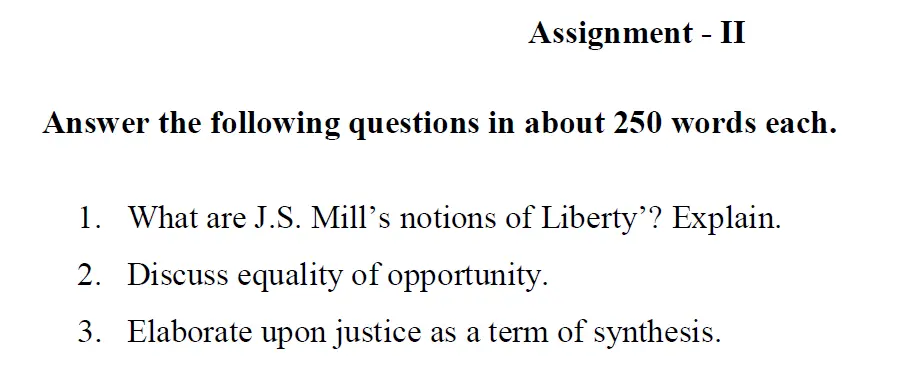
Q.4 Discuss equality of opportunity.
Ans. Equality of opportunity is an important concept that promotes fairness and justice in society. It means that every individual should have the same chances to succeed and reach their full potential, regardless of their background, gender, race, or socioeconomic status. In other words, everyone should have an equal starting point and an equal opportunity to achieve their goals.
Equality of opportunity recognizes that not everyone starts life with the same advantages or privileges. Some individuals may come from wealthier families, have access to better education, or have networks that provide them with opportunities. On the other hand, some people face obstacles such as poverty, discrimination, or limited resources that hinder their ability to thrive.
To ensure equality of opportunity, societies strive to create conditions that level the playing field. This can include policies and programs that provide equal access to quality education, healthcare, and basic resources. It also involves promoting equal treatment and non-discrimination in areas such as employment, housing, and public services.
By providing equal opportunities, societies maximize the potential of all individuals, regardless of their background. It allows people to pursue their interests and talents, contribute to society, and achieve their aspirations. It also fosters social mobility, where individuals can rise above their initial circumstances and succeed based on their merit and effort.
Promoting equality of opportunity is not only a matter of fairness, but it also benefits society as a whole. When everyone has an equal chance to succeed, it leads to a more just and harmonious society. It enhances social cohesion, reduces disparities, and taps into the talents and skills of diverse individuals.
However, achieving true equality of opportunity is an ongoing challenge. It requires continuous efforts to eliminate discrimination, provide quality education to all, and address socioeconomic disparities. It also necessitates creating supportive environments where individuals can thrive regardless of their background.
In conclusion, equality of opportunity is the principle that advocates for fairness and equal access to opportunities for all individuals. It recognizes that everyone should have an equal starting point and the same chances to succeed and fulfill their potential. By promoting equality of opportunity, societies create a more just and inclusive environment where individuals can thrive and contribute to the betterment of society.
Q.5 Elaborate upon justice as a term of synthesis.
Ans. Justice is a fundamental concept that plays a crucial role in maintaining fairness and harmony in society. It refers to the idea of treating individuals and groups equitably and ensuring that everyone receives what they deserve. Justice serves as a term of synthesis by bringing together various principles and values to create a balanced and just society.
In its simplest form, justice can be understood as giving each person their due. It means that people should be treated fairly and impartially, regardless of their background, wealth, or social status. Justice aims to ensure that individuals are not subjected to discrimination or prejudice and that everyone has equal rights and opportunities.
Justice involves upholding the rule of law. It means that laws should be applied consistently and impartially, and no one should be above the law. Justice requires that individuals who break the law face appropriate consequences while respecting their rights to a fair trial and due process.
Another important aspect of justice is the distribution of resources and opportunities.
A just society seeks to minimize inequalities and ensure that basic needs, such as food, shelter, healthcare, and education, are accessible to all. It recognizes that some individuals may need additional support to overcome disadvantages and achieve a level playing field.
Justice also encompasses the idea of restorative justice, which focuses on repairing harm and reconciling conflicts rather than merely punishing offenders. It emphasizes rehabilitation and providing opportunities for individuals to reintegrate into society positively.
Furthermore, justice requires considering the needs and perspectives of marginalized and vulnerable groups. It aims to address systemic injustices and structural inequalities that may exist within a society. This includes ensuring equal rights and protections for all, irrespective of their race, gender, religion, or other identities.
In conclusion, justice serves as a term of synthesis by bringing together principles of fairness, equality, and respect for the rule of law. It involves treating individuals equitably, ensuring access to resources and opportunities, and addressing systemic inequalities.
Justice plays a vital role in fostering a harmonious and inclusive society where every person can thrive and contribute. It is an ongoing effort that requires the active participation and commitment of individuals and institutions to create a just and equitable world.
Assignment – III
Q.6 Theory of Natural Rights.
Ans. The theory of natural rights suggests that every individual possesses certain rights that are inherent to their humanity. These rights are not given by governments or laws, but are believed to exist naturally. The theory states that these rights include things like life, liberty, and property.
It argues that governments should protect these rights and that individuals have a right to resist or overthrow a government that violates them. The theory of natural rights emphasizes the importance of individual freedom and the idea that all people are entitled to certain basic rights simply because they are human beings.
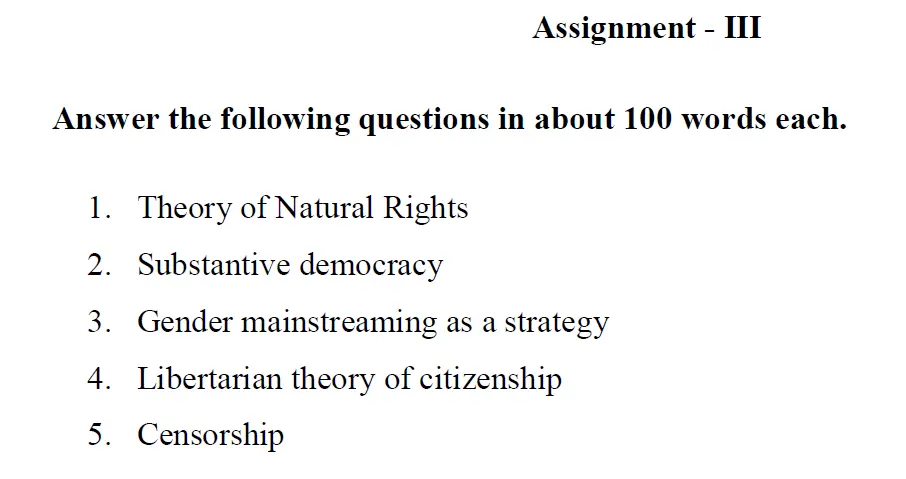
Q.7 Substantive democracy.
Ans. Substantive democracy refers to a form of democracy where the focus is not only on the procedures and mechanics of elections but also on ensuring the active participation and representation of citizens in decision-making processes.
In substantive democracy, there is a strong emphasis on the protection of individual rights, equality, and social justice. It involves creating a society where everyone has equal opportunities and where the government works to address the needs and concerns of all citizens. Substantive democracy aims to promote the well-being and welfare of the people, not just the formalities of holding elections.
Q.8 Gender mainstreaming as a strategy.
Ans. Gender mainstreaming is a strategy that aims to promote gender equality by considering the needs and perspectives of both men and women in all policies and programs. It recognizes that gender inequalities exist in society and seeks to address them systematically.
Gender mainstreaming involves integrating gender perspectives into decision-making processes, from planning to implementation, to ensure that both men and women benefit equally. It strives to eliminate discrimination and promote fairness by challenging gender stereotypes and creating opportunities for everyone to participate and thrive, regardless of their gender.
Q.9 Libertarian theory of citizenship.
Ans. The libertarian theory of citizenship emphasizes individual freedom and limited government intervention. According to this theory, citizens have the right to make their own choices without excessive interference from the government. It prioritizes individual rights, such as freedom of speech, property ownership, and economic liberty.
Libertarian citizenship emphasizes personal responsibility and self-reliance, where individuals are encouraged to take care of themselves and their own interests. It advocates for minimal government involvement in areas like the economy and social affairs, with the belief that this promotes individual liberty and allows citizens to pursue their own goals and aspirations.
Q.10 Censorship
Ans. Censorship refers to the control and suppression of information, ideas, or forms of expression by authorities or institutions. It involves limiting or restricting certain content from reaching the public. Censorship can take various forms, such as government regulations, media restrictions, or the banning of books or films.
While censorship is sometimes implemented to protect individuals from harmful or offensive material, it can also be used to control and manipulate information. It can limit freedom of speech and expression, hindering open discussions and the exchange of diverse viewpoints. Balancing the need for censorship with preserving individual rights and freedom of expression is a complex challenge.

